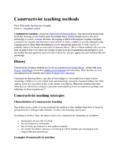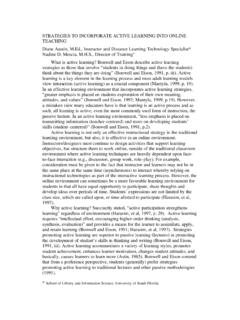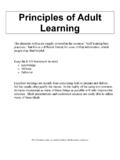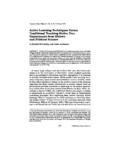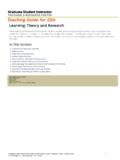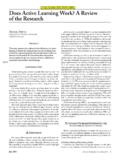Transcription of TEACHING - LEARNING METHODS IN …
1 1 TEACHING - LEARNING METHODS IN accounting education - AN EMPIRICAL RESEARCH IN THE BRAZILIAN SCENARIO Prof. Edson Luiz Riccio, - e-mail: BSc. Marici Cristine Gramacho Sakata - e-mail: Affiliation: University of S o Paulo - Brazil Faculty of Economics, Administration and Accountancy Department of Accountancy and Actuary Av. Prof. Luciano Gualberto 908 - FEA3 05508-900 Sao Paulo Brasil FAX: 55-11- 813 01 20 PHONE: 55-11- 3818 58 20 ABSTRACT The TEACHING of accounting is facing nowadays a significant challenge. Reason is that it aims educating youngster that are going to work in companies that use advanced Information Technologies and endeavor promoting continuous organizational changes. Those changes require constant attention and continuous adaptation from both academics and practitioners. To succeed, a neophyte has to be prepared on how to deal with these changes. It means not only receiving the necessary knowledge but also the abilities to adapt himself.
2 In general, it is accepted that if a Course provides the student with proper knowledge utilization skills, and necessary abilities the student will be able to adapt to the difficulties of a changing environment. It is recognized that the TEACHING method can influence in the development of several abilities such as: cooperation, leadership, responsibility, self-confidence, independence, and ability to decision making and communication skills. The purpose of this work is to study the TEACHING - LEARNING METHODS practiced in accounting courses in Brazil using a method of inquiry based on structured questionnaire. This study is part of a long-range research that the authors are developing since 1998 in the accounting education field. The first part is a review of the literature about TEACHING METHODS in accounting . The second part presents the results of two empirical researches.
3 First, a questionnaire was applied with questions regarding to TEACHING style, students characteristics and TEACHING resources. A sample of 35 lecturers of different universities was considered. Conclusions indicate that although TEACHING resources are available, less than 25% of the interviewees use any resources other than blackboard and overhead projector. A total of 72% of respondents would like to use different TEACHING METHODS . However, some barriers were appointed such as lack of time, working conditions and compensation. The second part of this empirical research is based in the author s previous research [1] on 460 master and doctoral thesis produced by Brazilian accounting academics from 1962 to 2000. It was found that 21 (4,5%) thesis approached accounting education . The major concern is with the low quantity of works in the accounting education area in the last five years.
4 2 INTRODUCTION The current accounting education scenario indicates the following major characteristics: a large number of accounting undergraduate courses, (more than 30 just in the City of S o Paulo [4]); an increasing competition in the job market and the recently instituted examination applied by the National Council of accounting as a mandatory requirement for certification. As a result, the search for higher quality in accounting education has become an important endeavour for all Brazilian education institutions. Dunkin shows that in at least 20 researches on the evaluation of instruction there are some evidence of the students' sensibility to the variation in TEACHING METHODS and there is also evidence that TEACHING processes vary in the size of their effects upon student evaluation [8]. Accordingly, choice of instruction method by lecturer should respond to it.
5 Countless factors influence the lecturer in the choice of the resources and METHODS to be used in classrooms such as cost, subject area, preparation time, knowledge of the method, risk of non acceptance, students feedback, incentive from institution, characteristics of the group and others. These empirical research intents to investigate how the lecturers identify and approach these issues and also to understand how their choice of TEACHING METHODS is affected. It is part of a long-range research that the authors are developing since 1998 in the accounting education field. The first part of this work concerns to a review of the literature of existing METHODS and its characteristics. The second part presents the results of two empirical researches. In the first one a questionnaire was applied with questions regarding to TEACHING style, students' characteristics and available TEACHING resources.
6 A sample of 35 lecturers from different universities located in different states was selected. The second one was based in the authors previous research [14] of all masters and doctoral thesis produced by Brazilian accounting academics between 1962 and 2000. It shows the amount of work in the education area produced by academics. The final results are discussed in the last part of the paper. BACKGROUND REVIEW For a better focus of analysis, brief concepts of LEARNING style, TEACHING METHODS and educational resources are presented, followed by examples of usage by professors in different universities. 3 LEARNING style LEARNING can be understood as a process of changing behaviour [12]. Several studies have been developed on LEARNING style of accounting and business students. One example is Kolb s LEARNING style model [10]. According to the author, learners rely on four different LEARNING modes: Immediate concrete experiences (CE), Reflection and Observation (RO), Abstract Concepts (AC) and Activate Experimentation (AE).
7 TEACHING Method The choice and utilisation of TEACHING METHODS is different for each environment due to specific characteristics such as culture and historical background. The METHODS can be utilised in each different environment considered it is adapted to local characteristics. Popham [12] suggests a process to be used by lecturers in the business education area. In the Picture 1, he suggests how to work with the competencies detected by needs of the learner and needs of the business. Picture 1 - TEACHING - LEARNING systems for business education . InputNeeds of thelearnerNeeds of business1. Identify and Classifycompetences3. ConstructingPerformance Goals2. Plan evaluations4. Identifying and SequencingSubcompetencies5. Pretesting andmatching Learner withPerformance Goals andsubcompetencies6. Applying AppropriateLearning Principles7. Select appropriateteaching-learningstrategies8. Evaluate studentachievement &effectiveness of systemRevise and ModifyMove to nextperformancegoalDid student achieve?
8 NoYes 4 A great variety of TEACHING METHODS is available for accounting education . These METHODS can vary in several dimensions such as degree of Information Technology usage, active student LEARNING , among others. Bonner [1] lists some TEACHING METHODS Available to accounting Lecturers, (performed by students): 1. Read text 2. Read work-out example problems (or objective questions) 3. Listen to lecture/watch video 4. Watch demonstration 5. Listen to and participate in interactive lecture 6. Answer short objective questions 7. Write and answer questions 8. Work short numerical problems 9. Work longer, unstructured cases and problems 10. Discuss issues with other students 11. Conduct research 12. Make oral presentations and answer questions 13. Participate in demonstrations (role-playing, simulation games, and experiments) The author also lists outdoor activities, visit to companies, internship, etc.
9 According to Duff [7] in a research conducted in England, the accounting TEACHING in the undergraduate level favours students with preferences to the theoretical LEARNING . However, there is no direct relationship between the performance and the preference by the LEARNING style. In this case, the accounting program can be wide, more innovative, and to adopt TEACHING METHODS that satisfy also those without preference for theoretical LEARNING . Deppe [6] enumerates the necessary Competencies for a successful professional that the educator should have in mind during the TEACHING process: 1) Communication skills 2) Ability to develop and to distribute information 3) Ability to decision making 4) accounting knowledge, auditing and taxation 5) Knowledge of business environment 6) Professionalism 7) Leadership development. Through the appropriate use of TEACHING METHODS , the lecturer is capable to make the students to acquire such competencies.
10 In the following table, the authors try to establish the relationship between the TEACHING METHODS and its possible effects on competencies, as well as some impediments of its usage by lecturers, based on several researches in the subject. 5 TEACHING Method Effects of TEACHING Method in Skills development - Factors most affected General Impediments for usage by lecturers 1) Traditional Lecture Knowledge acquisition, integration with other students - 2) Teamwork extra class Cooperation, Leadership, Responsibility, structured group task, interdependence, communication skills, shared responsibility 3) Teamwork during class Cooperation (social and interpersonal relationship skills), Leadership, Responsibility. structured group task, interdependence, communication skills, shared responsibility To instructor: the size of the class, time consumed by group work, problem of free riders in group situations.

